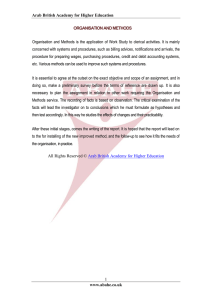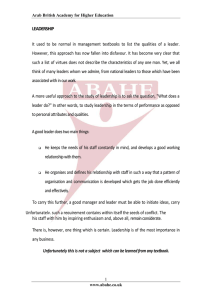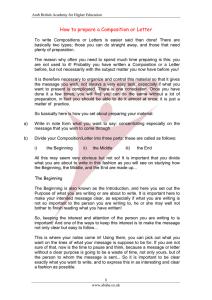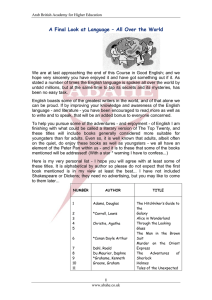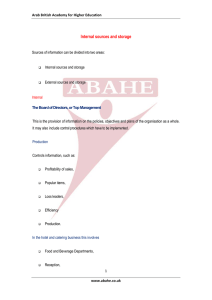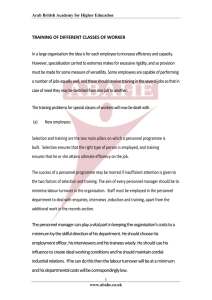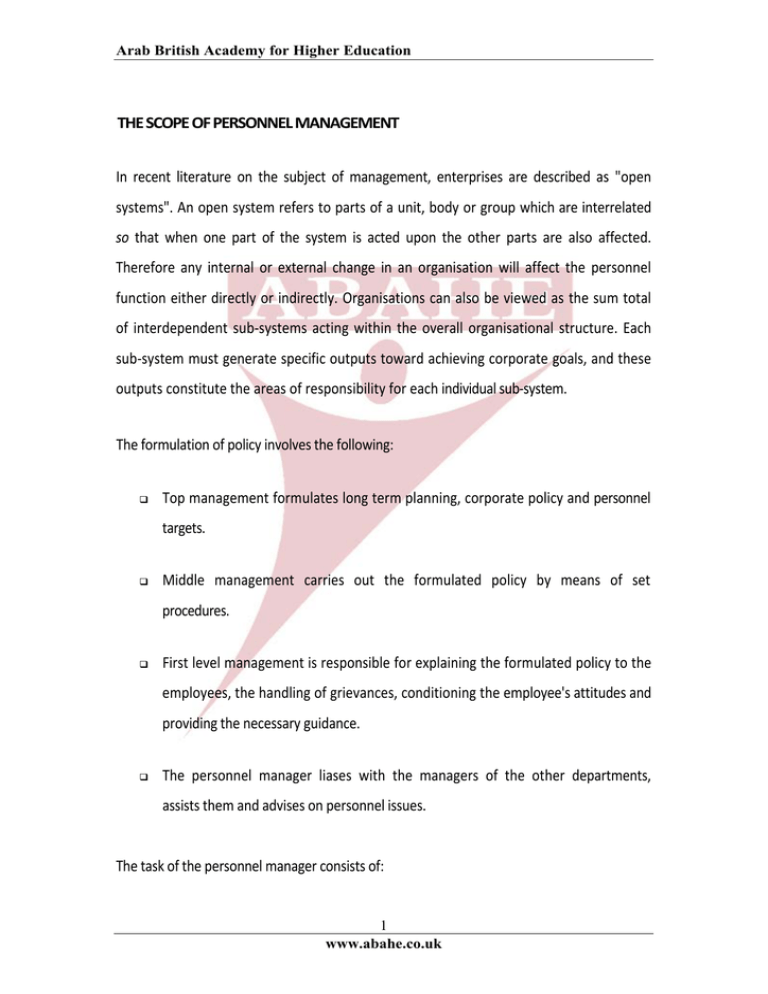
Arab British Academy for Higher Education
THE SCOPE OF PERSONNEL MANAGEMENT In recent literature on the subject of management, enterprises are described as "open systems". An open system refers to parts of a unit, body or group which are interrelated so that when one part of the system is acted upon the other parts are also affected. Therefore any internal or external change in an organisation will affect the personnel function either directly or indirectly. Organisations can also be viewed as the sum total of interdependent sub‐systems acting within the overall organisational structure. Each sub‐system must generate specific outputs toward achieving corporate goals, and these outputs constitute the areas of responsibility for each individual sub‐system. The formulation of policy involves the following:
Top management formulates long term planning, corporate policy and personnel targets.
Middle management carries out the formulated policy by means of set procedures.
First level management is responsible for explaining the formulated policy to the employees, the handling of grievances, conditioning the employee's attitudes and providing the necessary guidance.
The personnel manager liases with the managers of the other departments, assists them and advises on personnel issues. The task of the personnel manager consists of: 1
www.abahe.co.uk
Arab British Academy for Higher Education
Assisting the general manager as well as all line managers in achieving positive results by advising and helping them to interpret and carry out personnel policy.
Diagnosing and advising on employee attitudes, motivation, etc., by applying such techniques as questionnaires and analyses of labour turnover, complaints, e tc.
Through the personnel department he provides a service for all other departments of the organisation, namely procedures and services in regard to matters such as personnel recruitment, selection and training.
The personnel manager is responsible for co‐ordinating all activities relating to personnel matters, both internal and external to the personnel department. This represents a team effort between the personnel department and all other departments in the enterprise. For the above policies to be implemented successfully, it is necessary that certain conditions be maintained. These are:
There must be keen interest in the understanding of the function of the personnel department on the part of top management. Top management must give full support
It is essential that the personnel manager implement a sound and practical personnel policy to ensure that corporate goals are attained.
The implementation of personnel policy requires proper procedures and proper training. 2
www.abahe.co.uk
Arab British Academy for Higher Education
Personnel policy and procedure must be monitored and adjusted constantly. In particular, personnel management is concerned with:
Methods of recruitment, selection, training and education, and the proper placement of personnel.
Terms of employment, methods and standards of remuneration, working conditions, amenities and employee services.
The maintenance and effective use of facilities for joint consultation between employers and employees and between their representatives, and maintenance of the proper recognised procedures for the settlement of disputes. All these matters will be dealt with in subsequent lessons, but meanwhile, let us make a brief incursion into the subject of personnel management visa‐vie the other departments of the organisation. A personnel manager has to be careful that he does not infringe on the rights of other departmental managers, since he depends upon them to a great extent for the success of his own department and the general acceptance of the organisation's personnel policy. On the other hand, he cannot operate the personnel department in isolation. Personnel, management is not just another facet of the organisation's activity; it is the central function which permeates the whole field of management. Consequently, the chief executive cannot shed itself completely of the responsibility of dealing with personnel problems by the simple expedient of appointing a personnel manager and handing over the administration of personnel matters to him. The overall responsibility for an effective personnel policy lies fairly and squarely on the shoulders of the chief executive. When there is no personnel officer, the responsibility devolves, to a large extent, on the 3
www.abahe.co.uk
Arab British Academy for Higher Education
departmental heads, but where there is no overall company policy, there is not likely to be an effective policy administered by the subordinate heads. If there is a personnel manager, then he will interpret the general policy of the top management and endeavour to carry it into effect. More and more organisations are realising that personnel administration is a specialist function, and an effective policy cannot be carried out by heads of departments and supervisors, who are primarily concerned with the technical processes of the organisation. All Rights Reserved © Arab British Academy for Higher Education
4
www.abahe.co.uk

